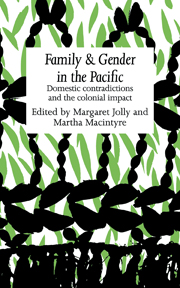Book contents
- Frontmatter
- Contents
- List of contributors
- Acknowledgements
- Map of main island groups of the Pacific
- Map of Papua New Guinea – Provinces
- Introduction
- 1 New England missionary wives, Hawaiian women and ‘The Cult of True Womanhood’
- 2 Changes in the lives of ordinary women in early post-contact Hawaii
- 3 Domestic structures and polyandry in the Marquesas Islands
- 4 The object lesson of a civilised, Christian home
- 5 Medical care and gender in Papua New Guinea
- 6 Suffer the children: Wesleyans in the D'Entrecasteaux
- 7 Women in contemporary Central Enga society, Papua New Guinea
- 8 Better homes and gardens
- 9 God, ghosts and people: Christianity and social organisation among Takuru Wiru
- 10 Sins of a mission: Christian life as Kwaio traditionalist ideology
- 11 Sacred spaces: churches, men's houses and households in South Pentecost, Vanuatu
- 12 Bond-slaves of Satan: Aboriginal women and the missionary dilemma
- Bibliography
- Index
Introduction
Published online by Cambridge University Press: 05 November 2011
- Frontmatter
- Contents
- List of contributors
- Acknowledgements
- Map of main island groups of the Pacific
- Map of Papua New Guinea – Provinces
- Introduction
- 1 New England missionary wives, Hawaiian women and ‘The Cult of True Womanhood’
- 2 Changes in the lives of ordinary women in early post-contact Hawaii
- 3 Domestic structures and polyandry in the Marquesas Islands
- 4 The object lesson of a civilised, Christian home
- 5 Medical care and gender in Papua New Guinea
- 6 Suffer the children: Wesleyans in the D'Entrecasteaux
- 7 Women in contemporary Central Enga society, Papua New Guinea
- 8 Better homes and gardens
- 9 God, ghosts and people: Christianity and social organisation among Takuru Wiru
- 10 Sins of a mission: Christian life as Kwaio traditionalist ideology
- 11 Sacred spaces: churches, men's houses and households in South Pentecost, Vanuatu
- 12 Bond-slaves of Satan: Aboriginal women and the missionary dilemma
- Bibliography
- Index
Summary
Pacific historians and anthropologists have long observed and commented upon the dramatic social and political changes that have occurred in response to colonial intrusion and pacification. As they describe the demise of indigenous political systems or the upheavals concomitant with new forms of economic activity there is often the implicit assumption that certain core institutions persist or that essential cultural characteristics are retained. In the Australian context, Aborigines, and even those who oppose their struggle for autonomy, subscribe to an idealised view of the desert or the ‘outback’ as the true locus of traditional continuity. The nomadic band of hunter-gatherers subsisting on their country is an image so compelling that it obscures the harsh realities of poverty both in large cities and rural regions and the facts of land alienation and cultural displacement. Similarly the idea of the unchanging village is as comforting to anthropologists as it is to many urban peoples in Pacific nations. The relative simplicity and monotonous regularity of quotidian activities in rural regions is seen to set them apart from the complexities and fast changes of the urban centres. And while some view outback Aborigines or Pacific villagers as those deprived of the benefits of technological and cultural advances, condemned to underdevelopment in remote backwaters, others see them as the guardians of custom, the true defenders of tradition. Both views fail to acknowledge how rural life has changed at its very core and that these processes of change began a long time ago.
- Type
- Chapter
- Information
- Family and Gender in the PacificDomestic Contradictions and the Colonial Impact, pp. 1 - 18Publisher: Cambridge University PressPrint publication year: 1989
- 8
- Cited by



